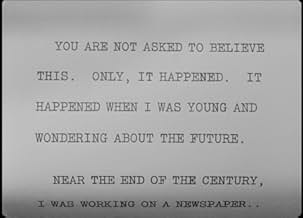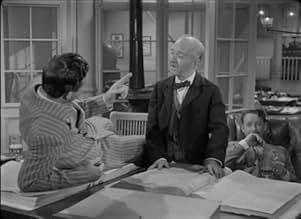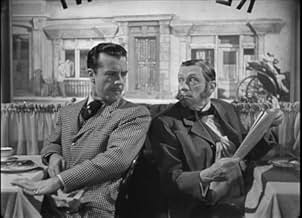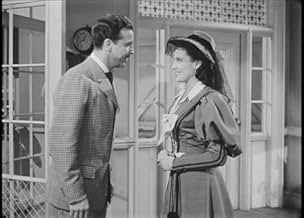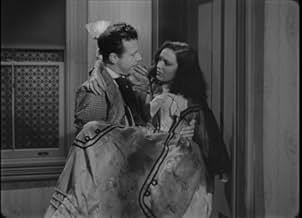Füge eine Handlung in deiner Sprache hinzuA young turn-of-the-century newspaper man finds he can get hold of the next day's paper. This brings more problems than fortune, especially as his new girlfriend is part of a phony clairvoya... Alles lesenA young turn-of-the-century newspaper man finds he can get hold of the next day's paper. This brings more problems than fortune, especially as his new girlfriend is part of a phony clairvoyant act.A young turn-of-the-century newspaper man finds he can get hold of the next day's paper. This brings more problems than fortune, especially as his new girlfriend is part of a phony clairvoyant act.
- Für 2 Oscars nominiert
- 2 Gewinne & 3 Nominierungen insgesamt
- Restaurant Owner
- (Nicht genannt)
- Show Spectator
- (Nicht genannt)
- Policeman
- (Nicht genannt)
- Racetrack Spectator
- (Nicht genannt)
- Wedding Witness
- (Nicht genannt)
- Gambler
- (Nicht genannt)
- Show Spectator
- (Nicht genannt)
Empfohlene Bewertungen
At this point in Dick Powell's career he was looking desperately to rejuvenate his career. His musical days were over, he left Warner Brothers, signed with Paramount looking for some straight acting parts, but Paramount mostly put him musicals and not as good as the ones he did with Warner Brothers.
Powell had scored some success in Preston Sturges's Christmas in July with no songs and he grabbed this one. He did well in the role here, but soon he'd change his screen image for all time later that year in Murder, My Sweet.
Exiled Rene Clair helmed this whimsical tale and got good results from his cast. Linda Darnell is as lovely as ever with her uncle Jack Oakie as a mind reading carnival act. And Edgar Kennedy does his patented slow burn as a police inspector who suspects the worst when Powell is scooping the police on some crime stories.
The plot has quite a few twists and turns and it would be a sin to give even one of them away. Powell and Darnell learn a most valuable lesson to take the future as it comes day by day. A little knowledge can indeed be a dangerous thing.
It's Twilight Zone material given a humorously light touch by the masterful Rene Clair, (And Then There Were None {1945}). Considering the final screenplay comes from as many as 7(!) writers, it's surprising the result holds together as well as it does.
A key point is watching such a spooky, noirish premise treated humorously, at times even bordering on the farcical. But the gimmick works surprisingly well, thanks also to a number of plausibly intelligent twists. Then too, Powell gets into the swing with a lively, engaging performance. And what a slice of eye candy is the sweetly innocent Darnell, a long way from her usual tough cookie specialty.
The premise amounts to an imaginative twist on the old concept of fate. The suspense comes from waiting to see how fate will play out. If you think about it, you see why the portent had to be couched as a newspaper headline. Otherwise the ending would have to be quite different.
Anyway, it's an entertaining movie, unusual for the unorthodox treatment. Still, it's that light touch that separates the material from the sci-fi pack for our post-Twilight Zone era.
The likable Dick Powell and the appealing Linda Darnell work well together, giving solid performances without trying to get more out of their characters than they should. Jack Oakie is nicely cast as the boorish uncle of Darnell's character, and he gets some very good moments.
The premise of reading tomorrow's news is certainly familiar in other forms and from other pictures, but it is the kind of interesting idea that always works well when it is in good hands. René Clair has the right feel for it, keeping things light most of the time, and adding some creative details. The story is often very clever in showing the ways that the advance knowledge both influences and misleads the characters.
The story moves fairly quickly, with some good period detail. It's an enjoyable movie and also, without being heavy-handed or obtrusive, illustrates some worthwhile ideas.
Wusstest du schon
- WissenswertesThe opera singer "Melba", whose concert is robbed as part of the plot, is Australian soprano Dame Nellie Melba (1861-1931). Peach Melba and Melba toast are both named for her.
- PatzerIn 1896 Cigolini (Jack Oakie) shoos away a (horse-drawn) cabbie with the injunction, "23, Skidoo!" That phrase only became a popular fad in 1905, and there's no record of "23" even by itself as slang before 1899.
- Zitate
Pop Benson: News is what happens. What's the difference whether it happens 50 years ago... or tomorrow?
Lawrence 'Larry' Stevens: You mean Will happen tomorrow.
Pop Benson: No. Time is only an illusion! Look, March 18, 1875. To the people then, this was the future; wasn't it? Well, suppose we were all living on that date in 1875... and I arrived with this book. I can tell you everything that will happen.
- Crazy CreditsLike many films of the time, this one encourages theatregoers to support the war effort. The third screen of credits seen at the end says: "Make it Happen Tomorrow Buy Bonds and Stamps Today!"
- Alternative VersionenThere is an Italian edition of this film on DVD, "ORE X: COLPO SENSAZIONALE", re-edited in double version (1.33:1 and 1.78:1) with the contribution of film historian Riccardo Cusin. This version is also available for streaming on some platforms.
- VerbindungenReferenced in Allein gegen die Zukunft (1996)
- SoundtracksBelieve Me If All Those Endearing Young Charms
(uncredited)
Traditional Irish melody
Lyrics by Thomas Moore
[Sung by those gathered at the beginning]
Top-Auswahl
- How long is It Happened Tomorrow?Powered by Alexa
Details
- Laufzeit1 Stunde 25 Minuten
- Farbe
- Seitenverhältnis
- 1.37 : 1
Zu dieser Seite beitragen



